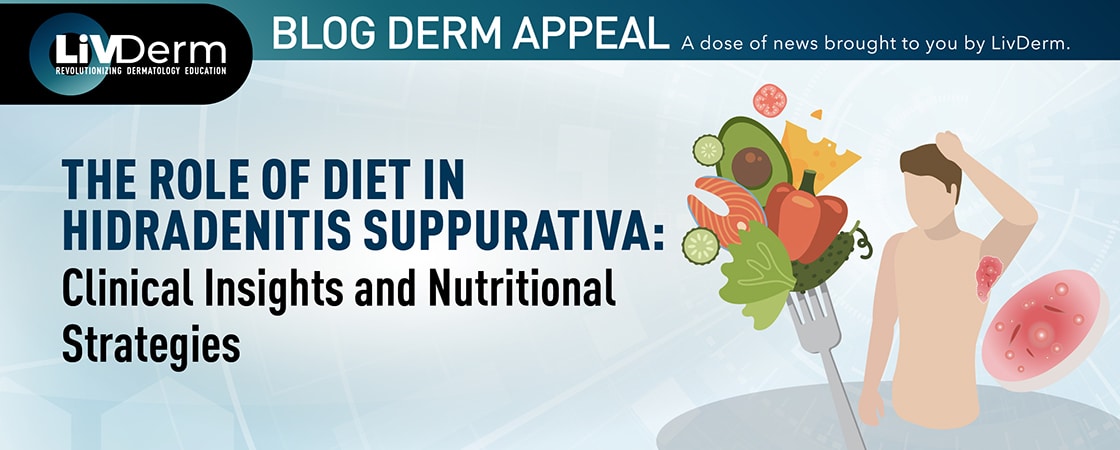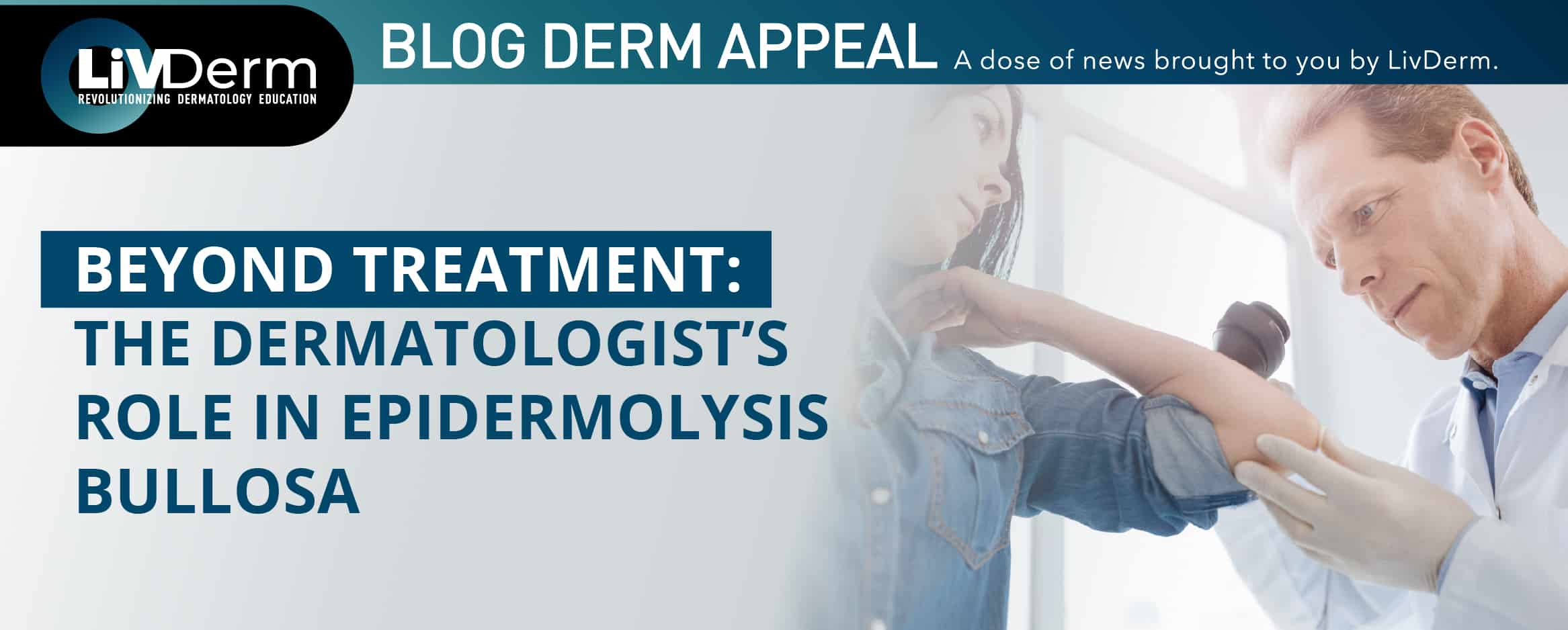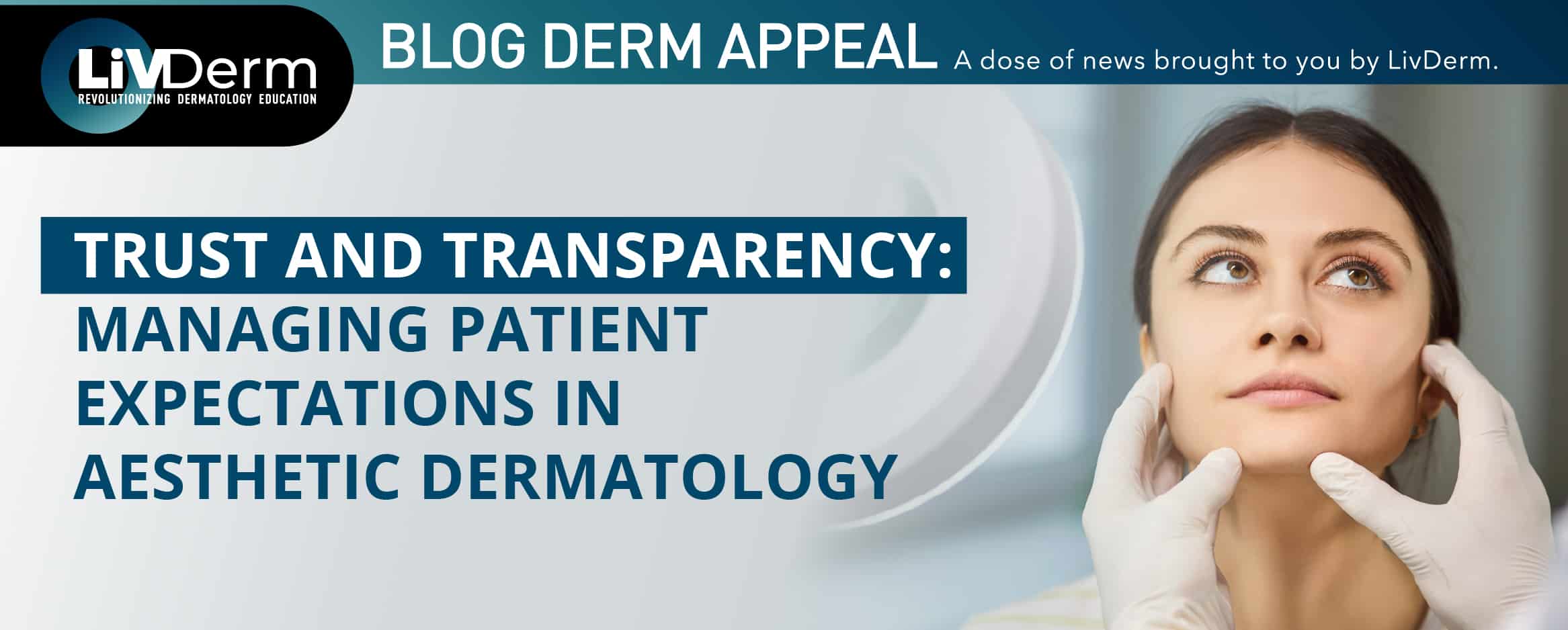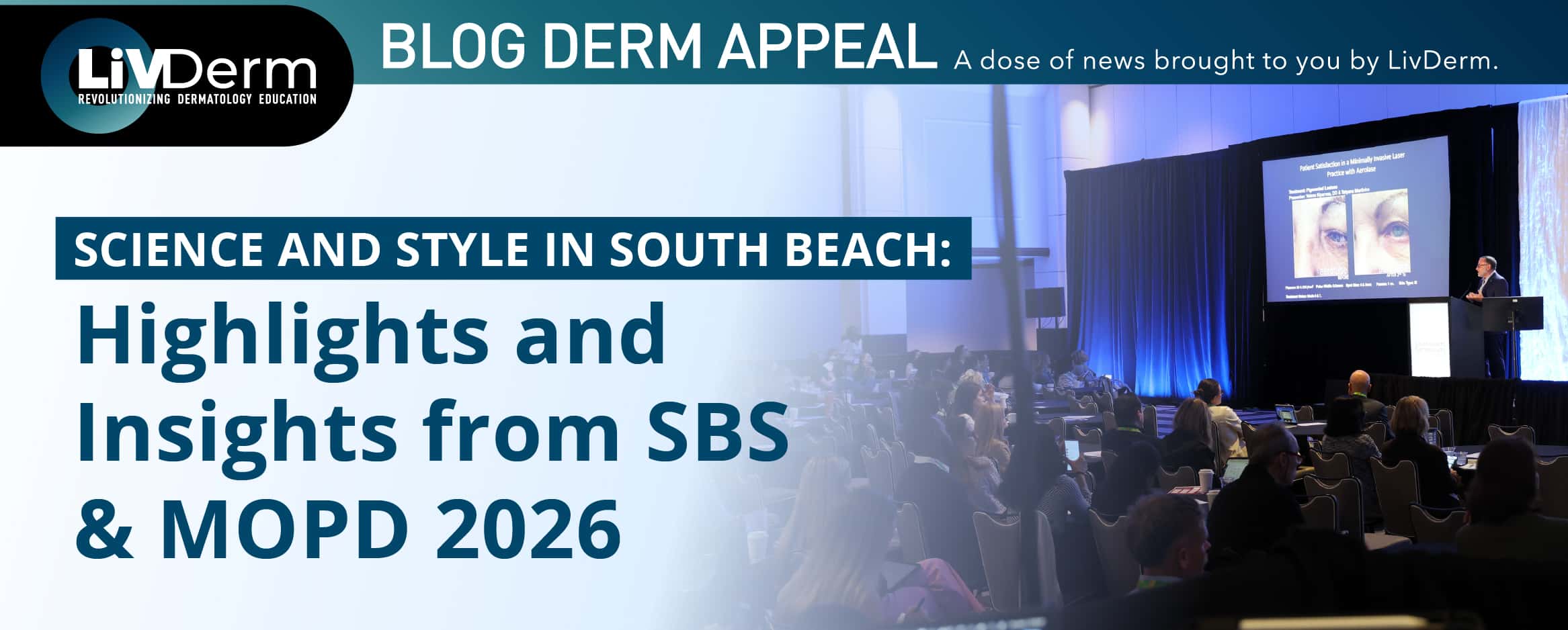Recent research has revealed that hidradenitis suppurativa (HS) is not solely an immunologic or genetic disorder, but one that is significantly influenced by environmental and lifestyle factors. These external contributors do more than merely exacerbate symptoms—they may play a fundamental role in disease pathogenesis through their effects on systemic inflammation, follicular occlusion, hormonal regulation, and skin microbiome balance. For dermatologists, having a nuanced understanding of these factors is crucial to supporting patients, improving therapeutic outcomes, and enhancing quality of life.
Among these many contributors, diet has emerged as one of the most discussed and potentially impactful factors in managing hidradenitis suppurativa, a chronic, inflammatory skin disorder marked by painful nodules, abscesses, and scarring. Primarily affecting body regions with a high concentration of sweat glands, such as the axillary, inguinal, gluteal, and inframammary areas, HS is estimated to affect 1–4% of the U.S. population. Beyond the physical discomfort faced by patients with HS, they may also experience profound psychological distress and a decline in their emotional well-being, significantly disrupting their daily functioning. With limited therapies available, patients have become increasingly interested in proactive, lifestyle-based strategies that complement medical treatment—and diet is often one of the first areas they’re willing to explore.
The Patient Perspective
For many patients living with HS, there is a strong willingness to experiment with diet changes and other lifestyle adjustments if there is even a chance of reducing symptoms. In clinical practice and even patient forums, many have shared their stories of dietary modifications leading to symptom improvement. This has served to reinforce a sense of control and hope for others struggling with this condition and is further supported by a growing body of literature that suggests certain dietary components can play a direct role in influencing disease severity. From a clinical standpoint, this high level of patient motivation represents a key opportunity for dermatologists to initiate constructive dialogue and collaborative care plans.
Dietary Mechanisms in HS Pathogenesis
HS is linked to chronic dysregulation of the body’s immune system, particularly involving cytokines like IL-1β, TNF-α, and IL-17, which contribute to inflammation and irritation in the skin. This inflammatory response leads to the painful bumps and lumps characteristic of HS. Certain foods—especially those with a high glycemic load, dairy products, and processed ingredients—can worsen these symptoms.
High-Glycemic Index Foods
High-glycemic index (GI) foods such as white bread, sugary snacks, and sweetened drinks, cause rapid spikes in blood sugar and insulin. This can increase levels of IGF-1, a hormone that stimulates skin cell growth and oil gland activity. Together, these changes can lead to clogged hair follicles, which is one of the main features of HS.
As dermatologists, encouraging patients to reduce their intake of refined carbohydrates can potentially reduce lesion formation and improve skin barrier stability. Various studies have demonstrated that patients with low-glycemic diets, including the Mediterranean diet, tend to experience reduced disease activity and better quality of life scores.
Dairy Products
Milk and other dairy products can influence hormone levels and may trigger inflammation in some individuals. Dairy contains bioactive compounds like androgen precursors and IGF-1—both of which can exacerbate HS affecting hormone and immune system activity. In addition, certain proteins in milk might act as triggers for those with food sensitivities.
A short-term elimination of dairy products may help identify whether it plays a role in symptom flares for individual patients. If improvements are noted, patients can transition to long-term avoidance or look to substitution options such as fortified plant-based alternatives.
The Mediterranean Diet
The Mediterranean diet (MD) emphasizes a high intake of vegetables, fruits, legumes, fish, whole grains, nuts, and olive oil, while limiting red meats, processed foods, and refined carbohydrates. It is widely recognized for its anti-inflammatory and cardiometabolic benefits, making it an appealing intervention in chronic inflammatory skin conditions like HS.
With such established benefits, emerging evidence continues to support the MD as beneficial for patients with HS. In a study conducted by Barrea et al., researchers evaluated MD adherence and nutritional status in patients with HS compared to matched healthy controls. They found that patients with HS had significantly lower adherence to the MD and worse body composition. Furthermore, higher adherence to the MD correlated with lower disease severity scores. As a result, the authors suggested that the anti-inflammatory effects of the MD may help modulate the clinical course of HS.
A study by Lorite-Fuentes et al. noted that the mechanisms behind the MD’s role in HS may be multifactorial. “On the one hand, it has been postulated that diet can alter the gut microbiome, modulating the inflammatory response and potentially changing HS activity. On the other hand, another possible explanation for the MD being related to lower disease severity is the reduction of chronic, systemic inflammation due to the anti-inflammatory and antioxidant properties of dietary fibers and polyphenols, and the low amount of low-refined carbohydrates.”
That said, while these findings align with prior research linking lower MD adherence to higher HS severity, the relationship between diet and HS is multifaceted. A recent case–control study in a Sardinian population did not find a significant association between MD adherence and HS severity, suggesting that dietary influence may vary by genetics or other environmental modifiers.
Based on existing evidence and research, dermatologists can guide their patients by recommending the MD as a means of promoting systemic anti-inflammatory balance and providing a general anti-inflammatory foundation for managing HS.
Food Sensitivities and Elimination Diets
As with many other chronic inflammatory conditions, some patients with HS report flares that are linked to specific foods such as gluten, yeast, or processed meats. While large-scale studies are lacking, small case series and patient testimonials suggest that personalized elimination diets may help uncover individual triggers.
If a patient is motivated and willing to try dietary changes, a structured elimination plan can be a useful diagnostic tool. Where possible and appropriate, dermatologists should coordinate with dietitians to ensure nutritional adequacy and prevent overly restrictive patterns that may harm overall health.
Final Thoughts
HS remains a complex disease and there is no one-size-fits-all cure. The research surrounding diet does, however, represent an exciting and empowering frontier for both patients and providers with the potential to significantly improve outcomes. As dermatologists, helping support and guide patients with practical lifestyle tools can lead to better engagement, symptom control, and long-term disease management. Together with medical treatment and multidisciplinary collaboration, patients are better able to navigate the physical and emotional challenges that accompany this chronic condition and find hope in holistic strategies. As research evolves, our understanding of the connection between diet and HS can only be expected to grow and offer new therapeutic insights.
Sources:
- Lorite-Fuentes I, Montero-Vilchez T, Arias-Santiago S, Molina-Leyva A. Potential Benefits of the Mediterranean Diet and Physical Activity in Patients with Hidradenitis Suppurativa: A Cross-Sectional Study in a Spanish Population. Nutrients. 2022 Jan 27;14(3):551. doi: 10.3390/nu14030551. PMID: 35276909; PMCID: PMC8840522.
- Velluzzi F, Anedda J, Pisanu S, Dell’Antonia M, Deledda A, Boi A, Ferreli C, Atzori L. Mediterranean diet, lifestyle and quality of life in Sardinian patients affected with Hidradenitis suppurativa. J Public Health Res. 2021 Nov 29;11(2):2706. doi: 10.4081/jphr.2021.2706. PMID: 34850622; PMCID: PMC8958440.
- Barrea L, Fabbrocini G, Annunziata G, Muscogiuri G, Donnarumma M, Marasca C, Colao A, Savastano S. Role of Nutrition and Adherence to the Mediterranean Diet in the Multidisciplinary Approach of Hidradenitis Suppurativa: Evaluation of Nutritional Status and Its Association with Severity of Disease. Nutrients. 2018 Dec 28;11(1):57. doi: 10.3390/nu11010057. PMID: 30597889; PMCID: PMC6356593.
- Vural, S., Baskurt, D., Yıldırıcı, Ş., Rasulova, G., Danacı, S. and Botsalı, A. (2024), Evaluating dietary considerations in hidradenitis suppurativa: a critical examination of existing knowledge. Int J Dermatol, 63: 987-998. https://doi.org/10.1111/ijd.17101

















